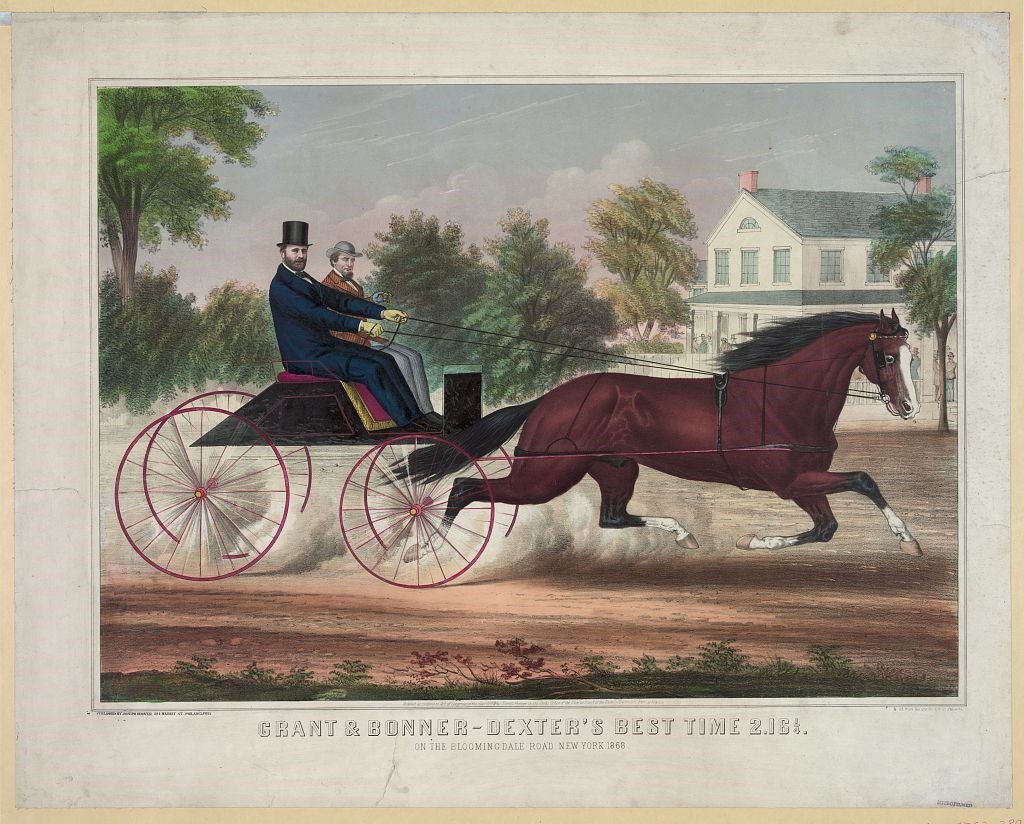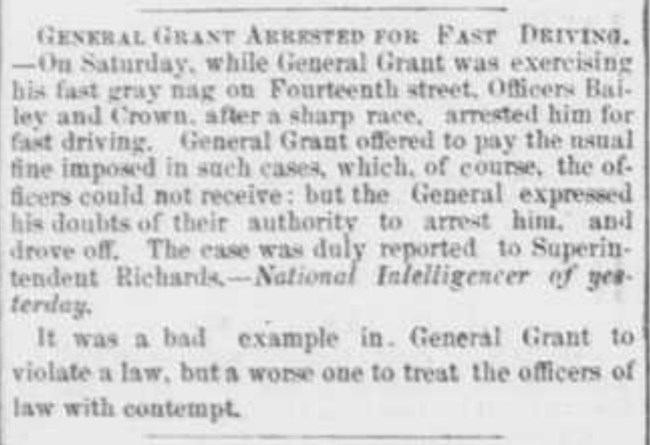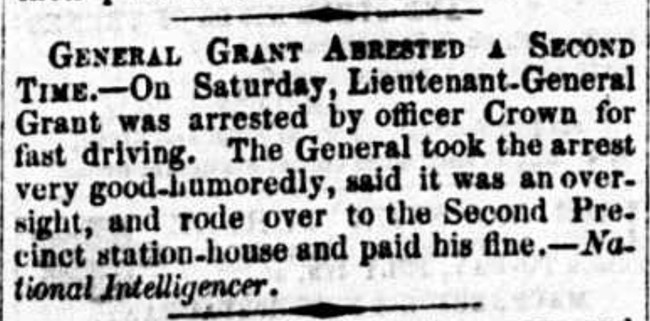Last updated: April 26, 2023
Article
Was General Grant Arrested for Speeding in Washington, D.C.?

Library of Congress
On September 27, 1908, The Sunday Star published an interview with retired police officer William West. A formerly enslaved man who had served in a United States Colored Troops infantry regiment during the Civil War, West joined the Washington, D.C. Metropolitan Police Force in 1871. In recalling his time with the police department, West made a stunning claim: he had arrested President Ulysses S. Grant for speeding in 1872.
The story, according to West, was that Grant enjoyed riding along 13th Street. “He [often] engaged in a speed contest with his friends,” West claimed, and “the street was at times dangerous for women and children. Citizens complained time and again to the police about the conditions prevailing along their street on account of the furious racing going on, and orders were issued for the police to stop the racers.” In West’s mind, President Grant set a bad example for other residents in Washington, D.C., with his fast riding. He intended to keep an eye out for any future incidents.
West soon caught Grant in the act of speeding. The president apologized to Officer West and promised to be more careful on the roads, but his behavior did not change. The next day, West caught Grant speeding at 13th and M Streets again. He told the president that he had to go to the police station, where he could put up a $20 collateral. Six other drivers who were friends of Grant were also arrested and levied the same $20 fine. The following day, the six men were given heavy fines and “a scathing rebuke” by the judge, but President Grant did not show up to court. Because of this absence, President Grant forfeited his $20 collateral. According to West, the two men nevertheless became friends and met “frequently” until Grant’s presidency concluded in 1877.
The problem with West’s account is that no primary source documents from 1872 are known to exist that can verify its accuracy.

Library of Congress Chronicling America
Park staff conducted newspaper research and were unable to find any articles from 1872 announcing President Grant’s arrest. Given that Washington, D.C. had seven daily newspapers at the time and 1872 was a bitterly divisive election year, the arrest would have made national headlines had it been announced by police or legal authorities in the city. Tentative research of other primary source documents from time has failed to produce definitive evidence. Additionally, The Papers of Ulysses S. Grant provide no information on an arrest of Grant that year, nor do they indicate that Grant and West maintained a friendship after 1872.
Interestingly, evidence from the time suggests that Grant was pulled over for speeding in 1866, when he was still Lieutenant General of the U.S. Army. On the one-year anniversary of General Lee’s surrender to Grant at Appomattox Court House on April 9, 1866, the Washington, D.C. National Intelligencer announced that while “exercising his fast gray nag” on 14th Street, Grant was detained by two officers for fast driving. Grant offered to pay the fine, but “expressed his doubts of their authority to arrest him and drove off.” Several days later, Grant “acknowledge the service of a warrant for fast driving and appeared before the Justice of the Peace and paid the fine.”
The National Intelligencer’s report was republished in newspapers around the country, including the New York Times. The Daily Richmond Whig reprinted the article but added its own short commentary, remarking that “it was a bad example in General Grant to violate a law, but a worse one to treat the officers of law with contempt.”

Library of Congress Chronicling America
Several months later, the Fourth of July issue of the Richmond Daily Dispatch reprinted a National Intelligencer article announcing that Grant was arrested a second time for speeding. “The General took the arrest very good humoredly, said it was an oversight, and rode over to the second Precinct station house and paid his fine.”
While the exact details of Grant’s alleged arrest or arrests are shrouded in ambiguity, it seems fair to conclude that Grant was a talented horseman who enjoyed pushing his horses to their maximum speed. He enjoyed the thrill of fast speeds and was probably warned by local law enforcement multiple times to slow down at the very least. Grant seems to have been skeptical as to whether he could be legally arrested but took these episodes good naturedly. He accepted the judgment of the courts when fines were levied against him.
This webpage will be updated if new information is discovered.
The park would like to thank Director of Research Ryan Semmes at the Ulysses S. Grant Presidential Library for his assistance with conducting research for this article.
